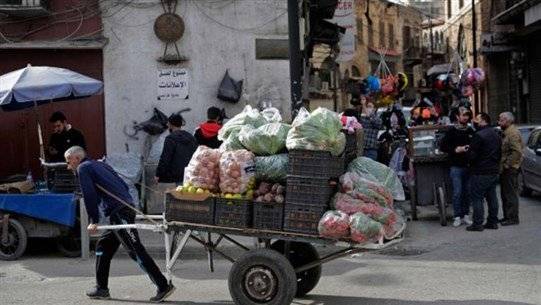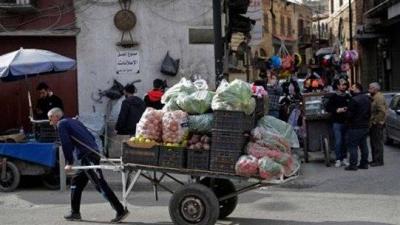Lebanese people summarize the changes in their lives over the past three years with the phrase "since the crisis began." They say it with shared sorrow, but each has their own details describing how the crisis has affected them, depending on age group, economic status, personal interests, and of course, the responsibilities they bear. So what does the crisis mean to a number of Lebanese individuals? Where do they find it, and when do they feel its weight?
**Um Ali (Housewife): Walking to Save Costs**
Um Ali wanders among the vegetable stalls, unsure of what to cook today given the rising prices. "We've given up meat, should we cook green beans without tomatoes, or okra without okra?" she murmurs aloud. When asked if she sees the economic crisis in vegetable shops, she responds, "The crisis follows us like our shadow, everywhere, at all times, even at family gatherings and breakfasts, it has become our only topic of conversation." She explains: "I see the crisis at the beginning of every month through the endless bills, just the electricity bill is a disaster in itself. I notice it in every store I visit through the shocking prices that keep rising continuously, the shortages of goods, and the changing brands on the shelves."
She chooses the green beans, puts them in her bag, and continues: "The crisis means that I have to walk long distances at sixty years old to save on transportation, and that I have to stand in line to buy a loaf of bread as if I'm begging for it."
**Sirin (School Student): Not Desiring Anything**
Sirin has completed her final exams for intermediate certification, passing with a good grade. She expected her summer vacation to be promising and filled with activities after a "tiring" school year, but "the economic crisis has changed a lot in our lives, to the point where we have become prisoners in our homes, not knowing how to spend our time after losing access to expensive entertainment options, aside from the costs of transportation that we count very carefully."
According to Sirin, the crisis means "not being able to go out on weekends as I used to, or buying clothes regularly as before." She was in a private school near her house, but the crisis itself will prevent her from continuing her secondary education there because "my parents cannot afford the tuition or the fees of any other private school, and while we are not sure if the public schools will open next year, I feel that the curse of the crisis has reached a level threatening my right to education as well."
She closes her eyes, without thinking long before admitting: "The crisis primarily means wanting to buy necessities, but not asking for them because I know my parents can't afford it; they can only provide the basics. It means eating the lentil dish I dislike and stopping the request for ready-made foods."
**Badi Bou Shakra (Actor): Mental Pressure**
When asked what the crisis means to him, Lebanese actor Badi Bou Shakra first thinks of "the existential threat to the vast world of art, including acting, which is the main domain of freedom and progress." How does this happen? He answers: "Through the slow production of local art due to liquidity issues, and the impact on joint artistic production with Arab countries due to the absence of the basic components of life necessary for filming." As for the Lebanese actor, "he is not spared from the arrows of the crisis either," since "he receives low fees because employers find life in Lebanon cheap when measured in U.S. dollars on one hand, and they see that the Lebanese are satisfied with meager fees due to tough economic conditions on the other hand."
On a personal level, Bou Shakra affirms that "actors live the crises just as Lebanese people do, with the difference that we showcase our lives as part of marketing our works and enhancing our image." His lifestyle has changed due to the pressing economic circumstances; he has reduced his travels and substituted them with local tourism, and cut down on visits to fancy restaurants and nightlife, opting instead for home gatherings. He sees no problem in this, but fears "the effects of mental pressure and frustration that may be caused by the inability to provide basic services."
**Mohammad Faqh (Pharmacist): Empty Shelves**
When we ask pharmacist Mohammad Faqh on the phone, "How do you see the economic crisis?" he is interrupted by patients and customers multiple times asking about medicines and ointments, inquiring: "How much does it cost in dollars?" We hear responses from the pharmacist: "There is an alternative, and this is out of stock." Our question about the crisis becomes absurd; the pharmacist sums it up by saying, "The crisis means we become like a robot that repeats: out of stock, subsidized, and alternative."
To him, the crisis is "the shortage of medicines, the price discrepancies between pharmacies, and the shockingly high prices that can reach one million and four hundred thousand, leading to disputes as if we were selling vegetables or clothes, even though the pharmacy is in Rawcheh and its customers are expected to be affluent." Although there have always been alternative medicines, the crisis "has created a vast gap between medicine prices; the difference can reach up to four hundred thousand sometimes; a painkiller and anti-inflammatory costing three hundred eighty thousand has an alternative that costs only ninety-five thousand."
He describes the crisis as "the empty shelves of certain medicines and the baby formula we are constantly asked about," and it means "not knowing when the support for them will be lifted." The crisis, in its "worst manifestations," is that "it has opened the door to smuggling and lawlessness in the pharmaceutical sector, producing suitcase traders who offer us to work together."
**Restaurant Owner: The Challenge of Survival**
The owner of the four restaurants and cafes named 77 sees the crisis as "a constant confrontation with challenges that have nearly overwhelmed us at many times and could lead to total closure in the absence of any clear plans or support from the state."
In his opinion, the economic crisis is a combination of crises "starting with the fuel crisis and the lack of electricity, the rising costs of alternative energy. It continues with the loss of primary foodstuffs and the appearance of others of lower quality, forcing us to bear additional expenses to maintain the best quality. It doesn’t stop at the banking crisis and the withholding of our deposits, inflation in prices, and rising service bills."
To endure, "we launched the slogan: our offers never end, and discounts started with us; the rest will follow." He conveys "fears of the crisis intensifying," but feels a responsibility towards a significant number of permanent, seasonal, and daily workers. Therefore, he sees the crisis as "an ongoing effort to survive, sustain workers, and improve their conditions."




